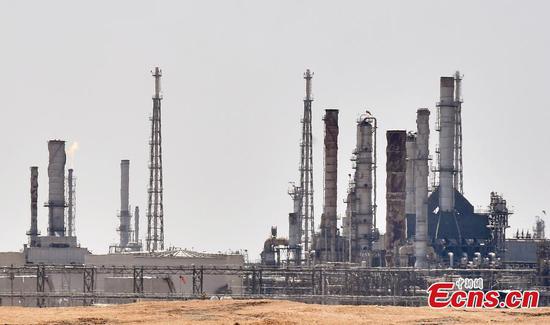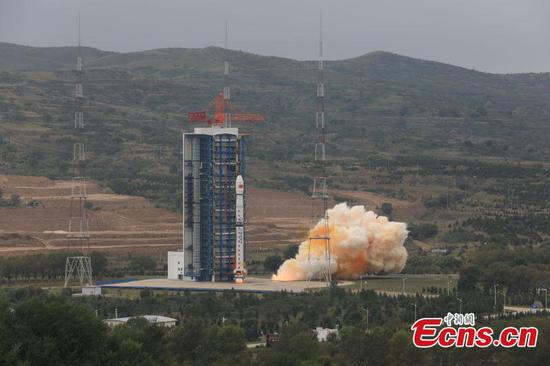Ample reserves, new energy development cushion effect: analyst
China's oil supply remains stable despite the Saturday attack on Saudi production facilities that sent oil prices soaring and would further interrupt global supplies, as the country has made increased efforts to diversify imported sources and boost the development of new energy, analysts said on Monday.
The impact of the attack on Aramco oil facilities was reflected in soaring oil prices on global markets on Monday.
Chinese oil shares closed higher in A-share market trading on Monday, as firms, including Tong Petrotech and XinJiang Beiken Energy Engineering Co, reported share prices rising to their daily limit of 10 percent. Chinese state-owned oil company China National Petroleum Corp saw its share price rise 3.5 percent in Monday trading, and shares of another oil giant Sinopec Group gained 2.69 percent on the Shanghai bourse.
Brent crude futures opened nearly 10 percent higher on Monday, surging by almost 20 percent. West Texas Intermediate futures jumped around 16 percent to $63.47 a barrel on the New York Mercantile Exchange.
Slower global economic growth in 2019 has seen global energy prices decline, and OPEC oil output has also been on a downward trend. The full impact of the attack on Saudi oil facilities on the global oil market remains to be seen, Fu Linghui, a spokesperson of the National Bureau of Statistics, said Monday at a press conference.
The attack on Saudi oil facilities will have a limited impact on China's oil supply, analysts said, noting that while it is not yet known if Chinese oil imports from Saudi Arabia will be affected, China will be capable of providing oil at home.
Saturday's attacks on Saudi Arabia's oil facilities are not the first, and the country has learned to quickly recover. "The impact on the [country's] ability to export is not as great as the market has estimated," said Zhou Rong, a senior research fellow at the Chongyang Institute for Financial Studies at the Renmin University of China.
Saudi Arabia's return to full oil production capacity after the attack could take weeks, Reuters said, citing a source close to the matter.
"Given its past experience, the damaged facilities can be expected to recover in due time, which means exports to China won't be affected," Zhou told the Global Times on Monday.
Secure reserves
The drone attacks by Yemen's Houthis are expected to reduce Saudi Arabia's oil output by 5.7 million barrels per day, or more than 5 percent of the world's oil supply, media reported.
Despite the disruption, China has abundant oil reserves to withstand possible disruptions in supply, Zhao Changhui, an oil economist and country risk analyst, told the Global Times on Monday.
In a bid to offset oil supply risks and cut the impact of fluctuating energy prices across the globe on the domestic industry, China launched a state strategic oil reserve base project in 2004, the Xinhua News Agency reported.
The state oil reserves include strategic storage bases such as those in Ningbo and Zhoushan, East China's Zhejiang Province, Qingdao, East China's Shandong Province, Dalian, Northeast China's Liaoning Province, and Dayawan, South China's Guangdong Province, and some corporate facilities.
China's strategic petroleum reserve capacity is expected to reach 85 million tons by 2020, roughly equivalent to 90 days of oil consumption in the country, media reports said.
Zhao said that the incident will not force China to adjust its energy strategy, and China's supply will still rely on imported oil.
"It should not cause too much concern [for China] as the commodity is globally circulated and provided," Li Jiawei, an analyst at industry website sci99.com, told the Global Times.
Li said Iraqi oil exports can cover any shortfall in Saudi Arabian oil exports to China, the world's largest importer of crude oil and natural gas. "Crude oil exports are not a monopoly of one country."
China's oil imports from Saudi Arabia reached a record high of 7.72 million tons in June, up 84.1 percent year-on-year. Imports stood at 4.7 million tons in May, according to the latest data released by China's customs authorities.
Saudi Arabia was China's largest oil supplier before 2016, the year Russia overtook the country and has been the largest supplier of oil for the past three years. Xinhua said in March that Russia hoped to cooperate with China in oil exploration, mining, processing and sales.
Other major oil sources include Angola, Oman, Brazil, according to sohu.com.
"Many countries are eagerly waiting opportunities to sell to China, which can alleviate any supply pressure if Saudi Arabia cannot sustain its exports," said Zhou, noting that China's reliance on oil imports is declining gradually.
China is nearly 70-80 percent reliant on oil imports, but is making huge efforts to diversify its supply sources, while pushing ahead with the development of new energy and renewable energy sources to reduce the country's reliance on oil, Zhou said.


















































